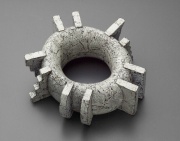Eggshell
Description
For bird eggs, it is the thin, brittle outer protective covering that is primarily composed of Keratin and Calcite. Ostrich eggshell beads are considered among the earliest ornaments created humans as their origins suggest they were crafted as early as 75,000 years ago in Africa. As the largest and thickest bird eggs, they were used to make art, jewelry and for carrying water. Additionally, eggshells have been used as a white pigment called shell white, with early examples in ancient Egypt, Greece, and Rome, and later in Europe and Japan. These pulverized eggshells were also used in grounds for silver point drawings. For preparation, the shells are washed, crushed and boiled in water with some Quicklime. The sequence is repeated until the eggshells form a fine, white opaque powder. commercially prepared shell white began about 1916-1919.
Synonyms and Related Terms
egg shell; shell white
Risks
- Soluble in acids
Physical and Chemical Properties
- Calcium carbonate (95-97%) in a protein matrix
Resources and Citations
- Wikipedia: Ostrich Eggshell Beads Accessed March 2025
- Wikipedia: Eggshell Accessed March 2025
- Caring for your Collections, Arthur W Schulz (ed.), Harry N. Abrams, Inc. , New York, 1992
- R.D. Harley, Artists' Pigments c. 1600-1835, Butterworth Scientific, London, 1982
- Dictionary of Building Preservation, Ward Bucher, ed., John Wiley & Sons, Inc., New York City, 1996


